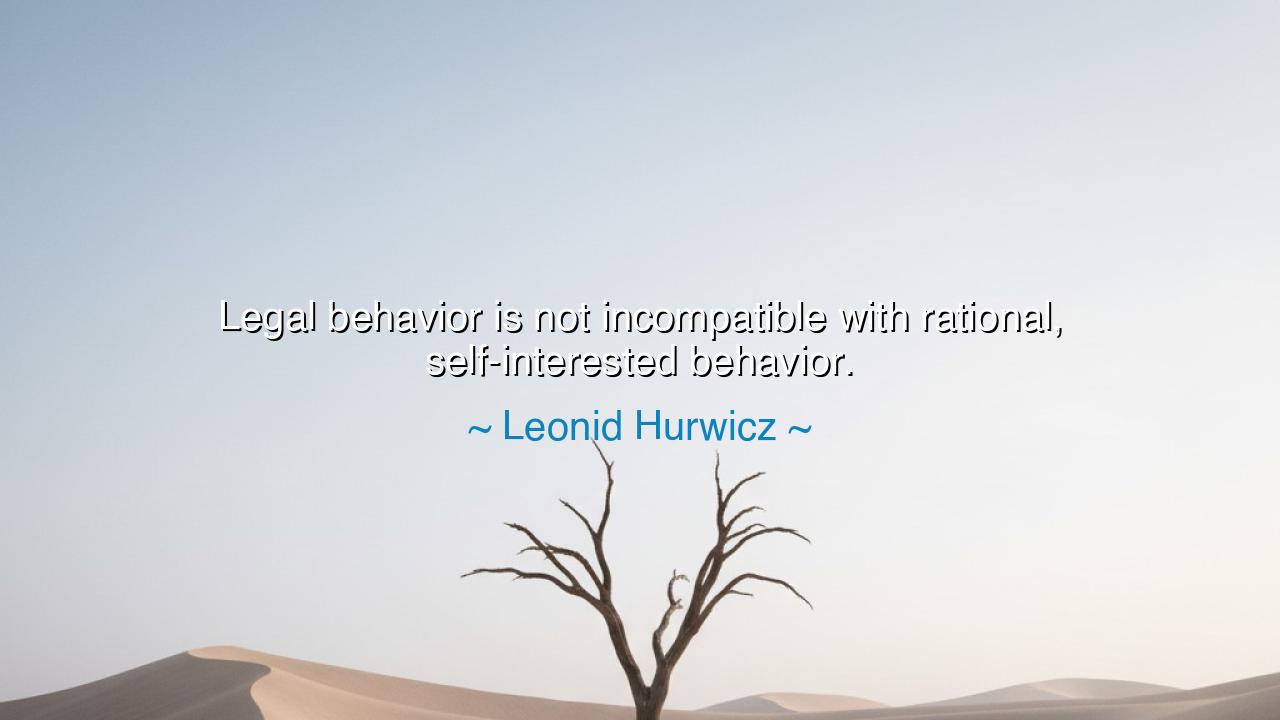
Legal behavior is not incompatible with rational, self-interested






When Leonid Hurwicz declared, “Legal behavior is not incompatible with rational, self-interested behavior,” he spoke with the calm authority of one who had spent his life studying the mysterious harmony between law, reason, and human desire. Beneath this deceptively simple statement lies a profound truth about the fabric of civilization itself — that the pursuit of self-interest, when guided by just laws and wise institutions, need not descend into chaos or greed. Hurwicz, one of the founders of mechanism design theory and a Nobel laureate in economics, understood that the genius of a well-ordered society lies in aligning individual ambition with the common good.
The origin of this quote can be traced to Hurwicz’s work in the mid-twentieth century, when economists sought to understand how systems of governance and markets could be structured so that rational individuals — each acting in pursuit of their own benefit — would nonetheless produce outcomes beneficial to all. This was no easy task, for history is filled with examples of self-interest unrestrained by law leading to ruin: the collapse of markets, the corruption of empires, the oppression of the weak. But Hurwicz, with a mind both mathematical and moral, demonstrated that legal frameworks, if designed wisely, could harness human nature rather than fight against it.
What Hurwicz meant was that rational self-interest and legal obedience are not enemies — they can be partners in the great dance of progress. For the law, when grounded in justice, is not a chain but a guide; and rationality, when tempered by ethics, becomes the engine of prosperity. He understood that people will act for themselves — it is the nature of life itself to seek its own flourishing. The task, then, is not to crush that impulse, but to build a system where acting well for oneself also means acting rightly toward others. Thus, law and reason, often seen as opposing forces, can instead converge into harmony.
Consider the great republics of history. When the Roman Republic thrived, it was because its citizens saw their civic duty not as a burden, but as a rational act of self-preservation — they understood that by defending the law, they defended themselves. But when greed outweighed honor, and men sought power without restraint, the republic fell. In contrast, the founding fathers of America, centuries later, designed a constitution meant to balance ambition with structure — a system where each branch’s self-interest would check the others. Their wisdom reflected Hurwicz’s insight: that good laws channel, rather than suppress, the energies of the individual.
This principle is no less true in our modern world. The most enduring institutions — from free markets to democratic governments — are those that recognize self-interest as an unchanging constant, and build around it systems of accountability and incentive. In business, for example, transparency laws and fair competition do not hinder prosperity; they ensure that the rational pursuit of profit strengthens society instead of exploiting it. A merchant who obeys the law not out of fear, but because it sustains his reputation and the trust of his customers, acts both rationally and legally. His gain and the public good become one.
Hurwicz’s wisdom invites us to rise above the false choice between morality and pragmatism. He teaches that ethical structure and rational conduct can coexist — that the enlightened individual sees no contradiction between justice and success. The fool thinks the law restrains him; the wise man sees that it protects his freedom. For it is not the rule that binds, but the corruption that breaks it. The rational citizen serves the law not because he must, but because he understands that without it, no one’s self-interest can survive.
So let this truth be passed down to all who build, lead, or dream: the strength of a society lies not in suppressing the self, but in guiding it toward virtue. To act legally and rationally is not weakness, but mastery — the mastery of aligning desire with wisdom, and freedom with fairness. As Leonid Hurwicz showed through both mathematics and philosophy, the highest form of order is not one that denies human nature, but one that refines it. Let every generation remember: the truly rational life is one that prospers within justice, not outside it. For only in that sacred balance between law and reason does civilization endure.






AAdministratorAdministrator
Welcome, honored guests. Please leave a comment, we will respond soon